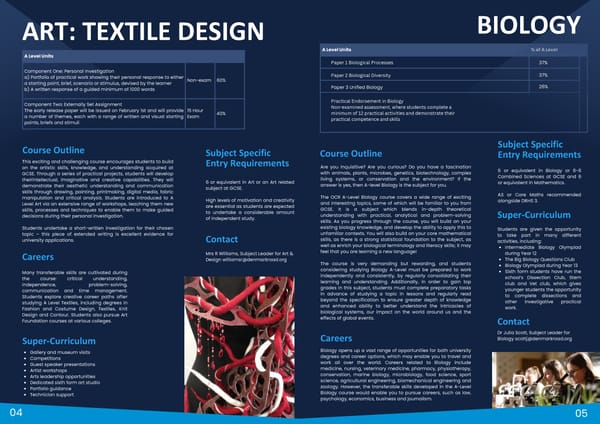BIOLOGY ART: TEXTILE DESIGN A Level Units % of A Level A Level Units Paper 1 Biological Processes 37% Component One: Personal Investigation 37% Paper 2 Biological Diversity a) Portfolio of practical work showing their personal response to either Non-exam 60% a starting point, brief, scenario or stimulus, devised by the learner 26% Paper 3 Unified Biology b) A written response of a guided minimum of 1000 words Practical Endorsement in Biology Component Two: Externally Set Assignment Non-examined assessment, where students complete a The early release paper will be issued on February 1st and will provide 15 Hour minimum of 12 practical activities and demonstrate their 40% a number of themes, each with a range of written and visual starting Exam practical competence and skills points, briefs and stimuli Subject Specific Course Outline Subject Specific Course Outline Entry Requirements This exciting and challenging course encourages students to build Entry Requirements Are you inquisitive? Are you curious? Do you have a fascination on the artistic skills, knowledge, and understanding acquired at 6 or equivalent in Biology or 6-6 with animals, plants, microbes, genetics, biotechnology, complex GCSE. Through a series of practical projects, students will develop Combined Sciences at GCSE and 6 living systems, or conservation and the environment? If the theirintellectual, imaginative and creative capabilities. They will 6 or equivalent in Art or an Art related or equivalent in Mathematics. answer is yes, then A-level Biology is the subject for you. demonstrate their aesthetic understanding and communication subject at GCSE. skills through drawing, painting, printmaking, digital media, fabric AS or Core Maths recommended The OCR A-Level Biology course covers a wide range of exciting manipulation and critical analysis. Students are introduced to A High levels of motivation and creativity alongside DRHS 3. and interesting topics, some of which will be familiar to you from Level Art via an extensive range of workshops, teaching them new are essential as students are expected GCSE. It is a subject which blends in-depth theoretical skills, processes and techniques to enable them to make guided to undertake a considerable amount understanding with practical, analytical and problem-solving decisions during their personal investigation. Super-Curriculum of independent study. skills. As you progress through the course, you will build on your existing biology knowledge, and develop the ability to apply this to Students undertake a short-written investigation for their chosen Students are given the opportunity unfamiliar contexts. You will also build on your core mathematical topic – this piece of extended writing is excellent evidence for to take part in many different skills, as there is a strong statistical foundation to the subject, as university applications. Contact activities, including: well as enrich your biological terminology and literacy skills; it may Intermediate Biology Olympiad feel that you are learning a new language! during Year 12 Mrs R Williams, Subject Leader for Art & Careers The Big Biology Questions Club Design [email protected] The course is very demanding but rewarding, and students Biology Olympiad during Year 13 considering studying Biology A-Level must be prepared to work Sixth form students have run the Many transferable skills are cultivated during independently and consistently, by regularly consolidating their school’s Dissection Club, Stem the course: critical understanding, learning and understanding. Additionally, in order to gain top club and Vet club, which gives independence, problem-solving, grades in this subject, students must complete preparatory tasks younger students the opportunity communication and time management. in advance of studying a topic in lessons and regularly read to complete dissections and Students explore creative career paths after beyond the specification to ensure greater depth of knowledge other investigative practical studying A Level Textiles, including degrees in and enhanced ability to better understand the intricacies of work. Fashion and Costume Design, Textiles, Knit biological systems, our impact on the world around us and the Design and Contour. Students also pursue Art effects of global events. Foundation courses at various colleges. Contact Dr Julia Scott, Subject Leader for Biology [email protected] Careers Super-Curriculum Biology opens up a vast range of opportunities for both university Gallery and museum visits degrees and career options, which may enable you to travel and Competitions work all over the world. Careers related to Biology include Guest speaker presentations medicine, nursing, veterinary medicine, pharmacy, physiotherapy, Artist workshops conservation, marine biology, microbiology, food science, sport Arts leadership opportunities science, agricultural engineering, biomechanical engineering and Dedicated sixth form art studio zoology. However, the transferable skills developed in the A-Level Portfolio guidance Biology course would enable you to pursue careers, such as law, Technician support psychology, economics, business and journalism. 0044 05 05
 Sixth Form Subject Pages 2025 Page 3 Page 5
Sixth Form Subject Pages 2025 Page 3 Page 5